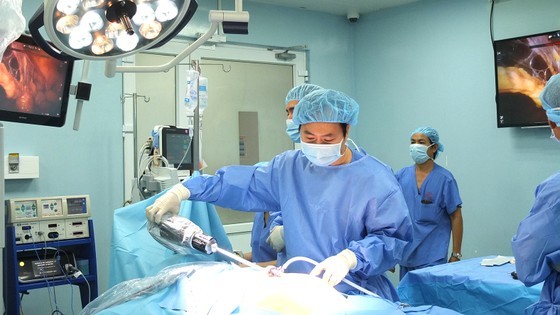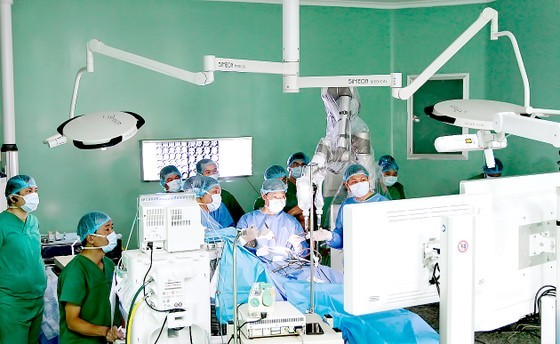Ho Chi Minh City-based Binh Dan Hospital performed its 2,000th robot surgery on May 25 after applying this kind of surgery for more than 6 years. Robot manufacturers and international colleagues highly appreciated this high number. Director of Binh Dan Hospital Associate Professor Tran Vinh Hung said that starting in 2016, the infirmary has deployed robotic surgery on adults. Since then, robotic surgery has been applied in the treatment of urinary tract, gastrointestinal, liver, biliary, pancreatic, thoracic, and endovascular interventions to treat cerebrovascular disease, heart, liver, kidneys, and intestines helping optimize the treatment process.
Not only Binh Dan Hospital but Cho Ray Hospital also performed surgical robots successfully in the treatment of hundreds of surgical cases each year.
In the field of obstetrics and gynecology, Ho Chi Minh City is known as the cradle in infertility treatment and Tu Du Hospital is leading the country. According to Dr. Tran Ngoc Hai, Deputy Director of Tu Du Hospital, this hospital has applied new assisted reproductive techniques that the world is doing such as the technique of injecting sperm into the egg cytoplasm, the technique of obtaining sperm from epididymal surgery, the technique of aspiration sperm from the epididymis techniques for reducing pregnancy, raising embryos, storing embryos quickly, maturing immature eggs in vitro; surrogacy and fertility preservation with storage of gametes or ovarian tissue.
 |
Doctors of Binh Dan Hospital perform an endoscopy for patients |
Currently, Tu Du Hospital's success rate of infertility treatment is more than 45 percent, equivalent to large birth support centers in the world.
The Oncology Hospital in HCMC has also deployed many specialized techniques to serve patients. Dr. Dang Huy Quoc Thinh, Deputy Director of Ho Chi Minh City Oncology Hospital, said that in 2022, the hospital will be the first public unit in the country to introduce a new generation gene sequencing test into a routine diagnosis of BRCA gene mutations. Besides, doctors have adopted new treatment methods in treating disease and their professional levels are as same as their peers in other specialized oncology hospitals in the region and the world.
In the field of pediatrics, Ho Chi Minh City has three leading pediatric hospitals in the South. The Children's Hospital 1 is famous for its interventional cardiac catheterization techniques, saving many lives of premature babies while the Children's Hospital 2 is known as the only pediatric organ transplant hospital of the southern region. The City Children's Hospital with many successful complex surgeries has also established an oncology department to carry out surgeries and apply chemotherapy, radiation therapy, nuclear medicine and palliative care for pediatric cancer patients.
According to Assoc. Prof. Tang Chi Thuong, Director of the Department of Health of Ho Chi Minh City, the professional qualifications and skills of the Vietnamese medical team are not inferior to any other country in the world. However, Vietnam is still lagging behind due to lack of proper investment and lack of appropriate development mechanisms.
Although the city’s health sector has made significant changes in past years, it still has many shortcomings including unmodern hospital facilities. Medical staff in public hospitals are not good at foreign languages enough to communicate with foreign patients who have needs medical treatment. Along with that, cooperation between the institute - university model has not been strong in promoting scientific research results, and in applying techniques and new technologies.
 |
A robotic surgery is carried out at the People's Hospital 115 |
Furthermore, medical tourism has not been given full attention, so it developed under expectation.
For the health sector’s effective development, experts believe that there should be coordination between departments. Along with that, there must be mechanisms and policies to mobilize social contributions in intensive health development as well as attract prestigious medical universities in the world to coordinate with domestic medical schools to train doctors according to international standards.
High-quality medical staff at home and abroad should be attracted to health care activities in the city. In addition, the health sector should take heed of the promotion of the development of an innovation ecosystem, contributing to digital transformation for the improvement of government efficiency and the quality of healthcare service delivery.
Director of the HCMC Department of Health Associate Professor Tang Chi Thuong said that appropriate mechanisms and policies such as lending to stimulate demand should necessarily be made for the development of private healthcare. There must be a policy to control the price of medical services not to create a burden for patients.
























